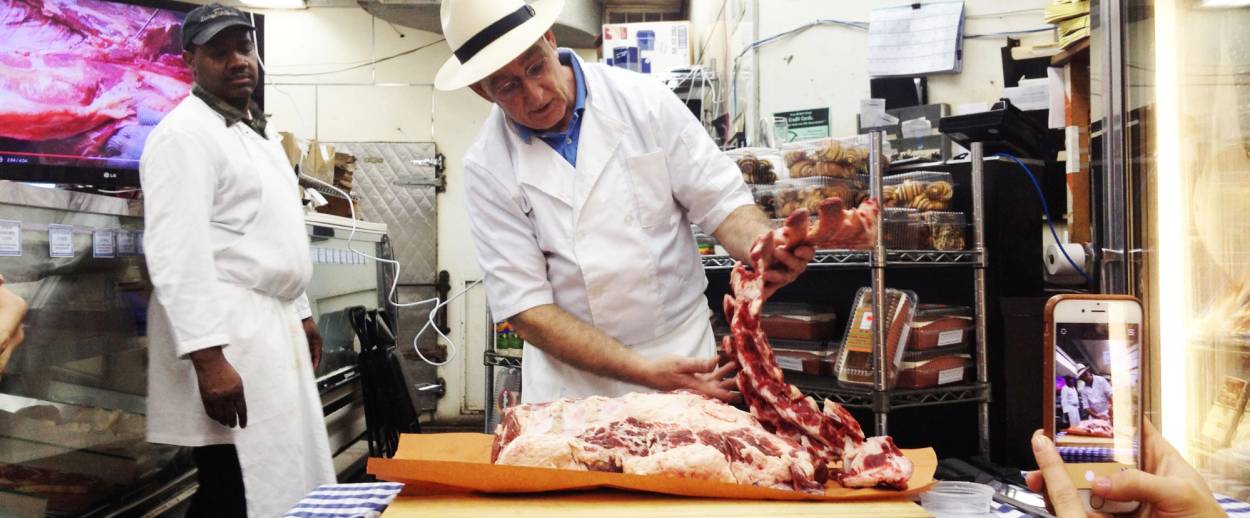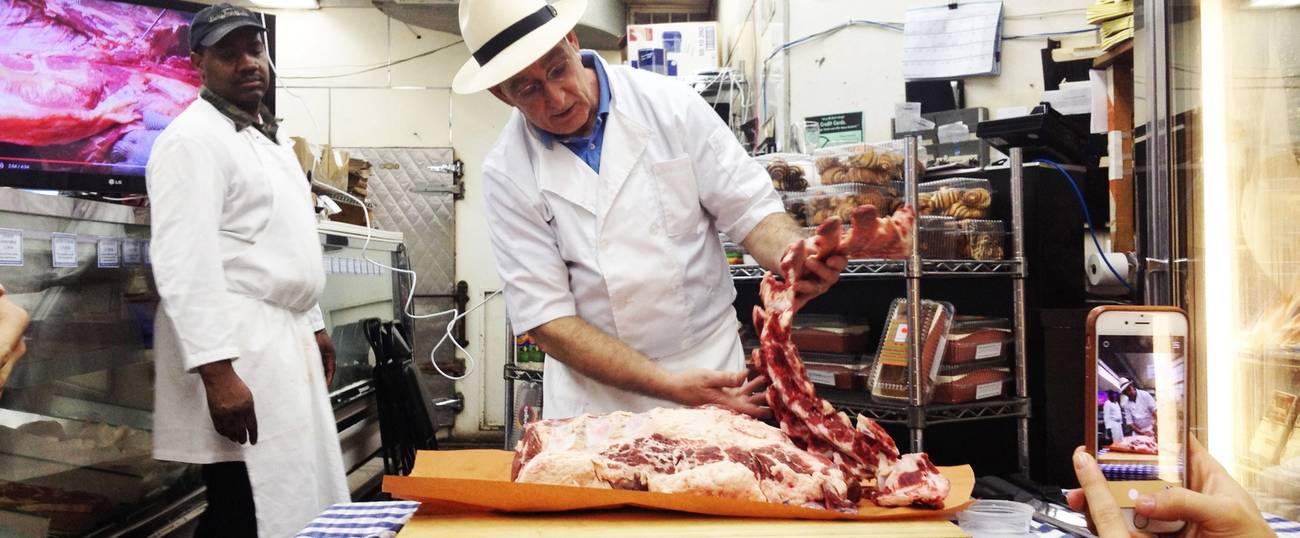Kosher Butchers on the Chopping Block
After decades of decline, the independent stores that remain have to find new ways to survive




It was after hours, at a storefront on 72nd Street in New York City. Inside, about a dozen journalists, myself included, chatted over glasses of wine and hors d’oeuvres, while the store’s proprietor, Paul Whitman, readied himself behind a table for a presentation. He fiddled with a computer and projector and invited everyone to take seats. Then he stopped to scrape a knife across a whetstone while one of his coworkers plunked a 25-pound beef shoulder in front of him.
Whitman owns Fischer Bros. & Leslie, a 66-year-old kosher butcher shop on the Upper West Side, thought to be the oldest in the city. He had invited us to his store for a hands-on demonstration in the art of kosher butchery. Since Morris and Louis Fischer first opened their business in 1949 (Whitman’s father-in-law, Leslie Niederman, a Holocaust survivor, joined the company a few years later), the store has been a constant on Manhattan’s Jewish food map. And Whitman, a trained biochemist and business school graduate-turned-full-time butcher, has kept business chugging well into the 21st century. But as he discussed the virtues of different knives, pointed out which veins need to be removed from a kosher animal, and broke down the shoulder into familiar cuts, I realized Whitman is one of a dying breed.
Like the synagogue and the mikveh (ritual bath), the skilled kosher butcher was once integral to settling a Jewish community. Without a source of kosher meat, a community would not sustainably grow. By the 1920s there were approximately 5,000 kosher butcher shops in the New York area, and another 5,000 spread across other U.S. cities. Often a single neighborhood, and sometimes a single street, would have multiple stores competing for the business of a discerning clientele.
Today, only a tiny fraction of those shops remain, leaving metropolises like Chicago and the Bay Area with just a single independent butcher, and other cities like St. Paul and Cincinnati with none. “When I grew up in Brookline, Massachusetts, there were four or five,” Rabbi Seth Mandel, who is a rabbinic coordinator for the Orthodox Union’s meat department, told me over email. “They have all disappeared.”
As with most societal shifts, there are a number of factors at play behind the kosher butcher’s disappearing act. For one, Jewish population centers have shifted and dispersed over time. And increasingly, Jews have stopped observing the traditional kosher laws their parents and grandparents followed, freeing them to purchase meat from non-kosher sources.
And yet the biggest blow to kosher butchers came from within the food industry: the supermarket. According to Sue Fishkoff’s book Kosher Nation: Why More and More of America’s Food Answers to a Higher Authority, the rise of the supermarket led to the direct decline of the kosher butcher, baker, and delicatessen.
“By the late 1960s, frozen kosher poultry and meat began showing up in supermarkets in neighborhoods with significant Orthodox populations, chipping away at the fresh butcher and fishmonger business,” she writes. Then, in 1979, a ShopRite in Lakewood, New Jersey, opened up a full-service kosher section with an in-store butcher and bakery. Over the next couple of decades, thousands of other supermarkets followed suit, luring away customers who once patronized local mom-and-pop stores. Supermarkets have had a similar impact on other small-scale food shops more broadly, including all kinds of butchers. But in tightly knit observant communities, the loss of these neighborhood fixtures has felt particularly acute.
Other systemic shifts have also played a role. “Part of the job of kosher butchers used to be kashering [salting and soaking] the meat,” Mandel told me. “Nowadays it is much more efficient to kasher large quantities of meat together at the production house. So most butchers get meat that has already been kashered.” Some butchers, like Fischer Bros. & Leslie, still kasher meat in-house whenever possible. But for those that don’t, they basically become retail stores that cut and display product—not so different from a supermarket, and typically more expensive.
The decline of kosher butcher shops was already well under way when Whitman began his career at Fischer Bros. in the early 1980s. “Most of them went away long before I started,” he said. Over the last three decades, as more shops continued to shutter, Fischer Bros. began to absorb some of their customers—and in some cases, their butchers. Fifteen years ago, the now 95-year-old Ernie Fleischman closed his decades-old butcher shop in Washington Heights and came in to work for Fischer Bros. “He takes the bus or Access-a-Ride downtown a few times a week,” Whitman said. “He’s the oldest working kosher butcher in the country, and he’s a pro.”
Interestingly, non-kosher butcher shops seem to be making a modest comeback, even in the face of supermarket competitors like Trader Joe’s and Whole Foods. Boutique stores like The Butcher & Larder in Chicago, Lindy & Grundy in Los Angeles, and Fleishers Craft Butchery in Brooklyn peddle specialized meat that appeals to today’s DIY-minded, small-scale-supporting food lover. There is even a butchers guild, founded in 2011, which unites artisanally minded butchers across the country. Despite their proximity to supermarkets selling organic and grass-fed meat and poultry, these shops manage to attract a devoted base of customers who are willing to pay more and go out of their way for a top quality product.
But while most of these new-school butchers keep food ethics at the forefront of their work, none of them—including Fleishers, which is owned by a Jewish couple who are descendants of kosher butchers—are certified kosher. (The current ad on Fleishers website for Porktoberfest makes that point quite clear.)
The few kosher sustainable meat and poultry businesses that have opened in the last decade—specifically Grow & Behold and Kol Foods—primarily sell their products to customers via the Internet. (Grow & Behold does work with a couple of butcher shops in communities where there is specific demand for their meat.)
So, what of the kosher butcher’s future? As with other declining Jewish food institutions—delicatessens, appetizing shops, dairy restaurants—there is a strong instinct to mourn the passing of America’s kosher butcher culture. But should we? Or are they simply a relic of a different time and irrelevant to today’s kosher consumers?
The answer, I think, is yes and yes. On the one hand, it is difficult to argue with the ease of one-stop shopping found at the supermarket. And yet, there is something to be said for the personal and intimate experience found at an independently owned shop. “We have been serving some families for three or four generations,” Whitman said. “We know our customers, we know what they like, and we can cater to them.” Meanwhile, independent butcher shops are also better equipped than supermarkets to provide specific cuts or unusual products. At the grocery store, whatever is prepackaged and wrapped in plastic is what’s available. “People who want meat cut to spec or want it ground a certain way have to go to a butcher,” said Naf Hanau, co-founder of Grow & Behold. Similarly, he said, you often can’t find certain cuts—for instance back ribs—packaged at a supermarket because the supply tends to get sent to restaurants. But a butcher can cut them on request.
Perhaps the secret of enduring butcher shops—the ones like Fischer Bros. & Leslie and Romanian Kosher Sausage Co. in Chicago, is to find a way to change with the times while staying true to one’s roots. In the appetizing world, the fourth-generation-owned Russ & Daughters, which has found a home in today’s artisanal food scene, offers a perfect example of how to grow strategically and well.
Fischer Bros. & Leslie also seems to understand this evolve-or-die mentality. While not as aesthetically hip as Russ & Daughters, it has expanded its business model to meet the community’s changing needs. The Upper West Side is home to a vibrant kosher-keeping community, but the butcher shop has expanded its business across the city and beyond. Fischer Bros. & Leslie delivers meat downtown, to the Hamptons, and to people’s vacation homes upstate, and ships across the country with overnight FedEx.
Meanwhile, Whitman said, “many families now have two parents working out of the home, which means there is a greater need for prepared foods.” In response, approximately 40 percent of the store’s business is made up of foods cooked in its in-house kitchen: everything from potato kugel and kasha varnishkes to kale salad and quinoa with slivered almonds. Fischer Bros. & Leslie also makes rotisserie chicken, which can be difficult to find with kosher certification, and recently bought a sous vide machine to start experimenting with roast beef.
Still, when it comes to the heart of what they do—kashering and cutting meat—Whitman said not much has changed since the Fischer brothers first opened for business in 1949. “After all these years, we like to think we have that part down.”
***
Like this article? Sign up for our Daily Digest to get Tablet Magazine’s new content in your inbox each morning.